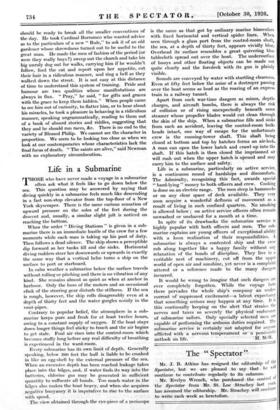Life in a Submarine
rrHosE who have never made a voyage in a submarine. often ask what it feels like to go down below the sea. This question may be answered by saying that diving quickly in a submarine feels much like descending in a fast non-stop elevator from the top-floor of a New York skyscraper. There is the same curious sensation of upward pressure on the soles of the feet during the descent and, usually, a similar slight jolt is noticed on reaching the bottom.
When the order " Diving Stations " is given in a sub- marine there is an immediate hustle of the crew for a few moments while each man is taking up his post of duty. Then follows a dead silence. The ship shows a perceptible dip forward as her tanks fill and she sinks. Horizontal diving rudders steer her downwards or upwards in exactly the same way that a vertical helm turns a ship on the surface to port or starboard.
. In calm weather a submarine below the surface travels without rolling or pitching and there is no vibration of any kind. She remains almost as quiet as when at anchor in harbour. Only the hum of the motors and an occasional clink of the steering gear disturb the stillness. If the sea is rough, however, the ship rolls disagreeably even at a depth of thirty feet and the water gurgles noisily in the vent-pipes.
Contrary to popular belief, the atmosphere in a sub- marine keeps pure and fresh for at least twelve hours, owing to a constant supply of oxygen. If the boat stays down longer things feel sticky to touch and the air begins to get stale. Foul air rises into the control-room which becomes stuffy long before any real difficulty of breathing is experienced in the ward-room.
Every submarine has its own liMit of depth. Generally speaking, below 200 feet the hull is liable to be crushed in like an egg-shell by the external pressure of the sea. When an- excessive depth has been reached leakage takes place into the bilges, and, if water finds its way into the batteries, chlorine gas may be generated in sufficient quantity to suffocate all hands. Too much water in the bilges also makes the boat heavy, and when she acquires negative huoyandy it is imperative to rise to the surface with speed. • The view obtained through the eye-piece of a periscope is the same as that got by ordinary marine binoculars with fixed horizontal and vertical spider lines. When seen through a glass port from the control-room shaft, the sea, at a depth of thirty feet, appears vividly blue. Overhead its surface resembles a great quivering blue tablecloth spread out over the boat. The undersurface of buoys and other floating objects can be made out quite clearly and the foredeck with its gun is plainly visible.
Sounds are conveyed by water with startling clearness. Even at fifty feet below the noise of a destroyer passing over the boat seems as loud as the roaring of an express train in a railway tunnel.
Apart from such war-time dangers as mines, depth- charges, and aircraft bombs, there is always the risk of collision or of rising unexpectedly beneath some steamer whose propeller blades would cut clean through the skin of the ship. When a submarine fills and sinks from such an accident, leaving the control-room bulk- heads intact, one way of escape for the unfortunate crew is the conning-tower shaft. This shaft being closed at bottom and top by hatches forms an air-lock. A man can open the lower hatch and crawl up into the shaft. If this hatch is then closed the imprikmed air will rush out when the upper hatch is opened and may carry him to the surface and safety.
Life in a submarine, particularly on active service, is a continuous round of hardships and discomforts. The. Admiralty, recognizing this fact, awards special " hard-lying " money to both officers and crew. Cooking is done on an electric range. The men sleep in hammocks or on any clear space of deck available. They very soon acquire a wonderful deftness of movement as a result of living in such confined quarters. No smoking is allowed below ; on active service officers often remain unwashed or unshaved for a month at a time.
In spite of its drawbacks the submarine service is highly popular with both officers and men. The sub- marine captains are young officers of exceptional ability with a keen realization of their responsibilities. A submarine is always a contented ship and the crew rub along together like a happy family without any relaxation of the bonds of discipline. They live in a veritable nest of machinery, cut off from the upper world of open air and sunshine, yet never is a complaint uttered or a reference made to the many dangers incurred.
It would be wrong to imagine that such dangers are ever completely forgotten. While the voyage lasts there pervades the whole ship's company an under- current of suppressed excitement—a latent expectancy that something serious may happen at any time. It is this continually keeping on the alert that strains the nerves and taxes so severely the physical endurance of submarine sailors. Only specially selected men are capable of performing the arduous duties required. The submarine service is certainly not adapted for anyone afflicted with a nervous temperament or a pessimistic


























































 Previous page
Previous page